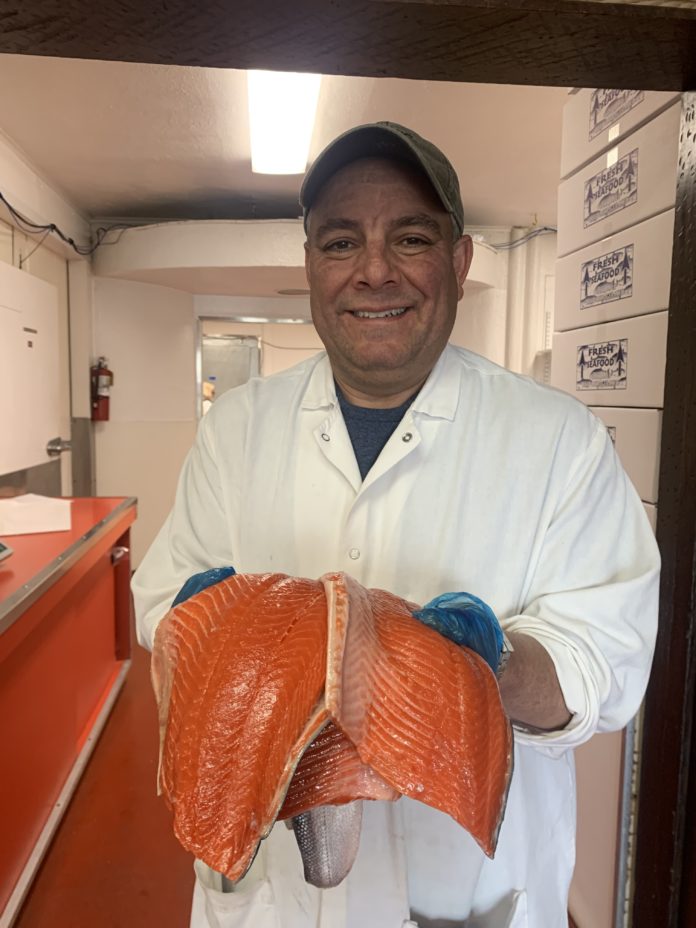
An executive order signed by President Joe Biden aims to put a stop to the import of any Russian seafood into the U.S., including all seafood harvested in Russian waters or by Russia-flagged vessels, even if processed in a third country including China.
The order signed on Dec. 22 by Biden, is one of a number of steps the Biden administration is taking to halt the financial facilitators of Russia’s war on Ukraine. The Biden administration noted that foreign financial institutions risk losing access to America’s financial system if they engage in facilitating significant transactions relating to Russia’s military industrial base.
The order said that the Treasury Department would issue a determination identifying specific types of seafood that will be subject to this prohibition. Treasury Secretary Janet Yellen hailed the order, issuing a statement saying: “the United States and our global coalition have put in place historic sanctions and export controls that have severely restricted Russia’s ability to equip its military to wage its brutal and unjustified war against Ukraine. Over nearly two years, our sanctions have significantly weakened the Russian economy and undermined the Kremlin’s war effort.”
“Today we are taking steps to level new and powerful tools against Russia’s war machine,” Yellen’s statement continued. “As a result of our restrictions, Russia has increasingly shifted certain trade and financial flows through third countries to evade sanctions and continue its procurement of critical items for their wartime production.”
While the ban on new contracts to import Russian seafood is immediately effective, domestic importers who have current contracts for purchase of Russian seafood have 60 days to bring in their order from the country where it is processed. No contracts for such imports signed after Dec. 22 are valid.
Alaska’s congressional delegation, which has been working for several years to put a plug in the import of Russian seafood, particularly Russian seafood processed in China, hailed the Biden executive office.
Sens. Lisa Murkowski and Dan Sullivan, both R-Alaska, noted that Russia has maintained a one-sided ban on U.S. seafood imports since 2014. Following Russia’s invasion of Ukraine, Russia began flooding the international market with underpriced seafood to help fund the war. After Biden issued an executive order in March 2022 blocking import of Russian seafood, Russia moved to bypass those sanctions by reprocessing its seafood in China, making it officially a product of Chia for the purpose of U.S. country-of-origin labeling.
“In the midst of a truly difficult time for Alaska’s fishermen, these are stabilizing steps that will help end Russia’s evasion of sanctions and China’s dumping of overharvested Russian fish onto American markets,” said Murkowski. “That, in turn, will help seafood prices recover, restore balance and basic fairness to markets, and cut off a key source of funding for Putin’s catastrophic war in Ukraine, all at the same time.”
She commended all those, including Sullivan, who have led the charge to protect Alaska’s fishing industry, and thanked the Biden administration “for coming around and seeing the wisdom in addressing Russia’s malign behavior.”
“If you’re an American importer you better know where it was coming from,” said Sullivan, during a news conference following announcement of the president’s order.
Sullivan spoke at length about the new ban on Russian sourced salmon, pollock, cod, and crab, saying the Russian ban on import of U.S. seafood constituted “a completely unfair, one-sided trade relationship that has significantly hurt Alaska fishermen.”
The problem was when the 2022 executive order was issued Russia simply “skirted the ban by sending their fish to China… and it was coming in almost duty free, done with human rights abuses and slave labor in China,” Sullivan said, adding that China has “the lowest environmental standards in the world.”
The situation up to now has driven down seafood prices “and hurt hardworking American fishermen, especially in Alaska, while providing substantial revenue to support Russia’s invasion of Ukraine and bolstered human rights abuses in China,” he said.
Several major processors of Alaska seafood, including Trident Seafoods and Ocean Beauty Seafoods, recently announced significant changes in their operations, due to difficulties in the global seafood market.
Trident plans to overhaul Alaska operations by selling several of its Alaska processing facilities in Kodiak, Ketchikan, Petersburg, and False Pass. Ocean Beauty Seafoods said its distribution facilities in Astoria and Portland, Oregon; Boise Idaho; Dallas, Texas; Helena, Montana; and Salt Lake City, Utah, are for sale.
The conservation entity Oceana also hailed the Biden executive order for recognizing the importance of tackling illegal, unreported and unregulated (IUU) fish head on.
“Import controls are critical tools to help ensure U.S. dollars do not support illegal fishing and other illicit activity,” said Oceana Campaign Director Max Valentine. “All seafood imports should be required to come with catch documentation and traceability to ensure seafood sold in the U.S. is safe, legally caught, responsibly sourced, and honestly labeled.”
“The National Oceanic and Atmospheric Administration (NOAA) recently withdrew a proposal to expand the Seafood Import Monitoring Program (SIMP), which helps prevent products of illegal fishing, seafood fraud, and human rights abuses from ending up on our grocery shelves and dinner plates,” he said. “NOAA should be strengthening and expanding SIMP to protect U.S. fishers and consumers who are undermined by IUU fishing.”
Tracy Welch, executive director of United Fishermen of Alaska (UFA) applauded closure of the Russian seafood import loophole.
UFA has long prioritized addressing inequitable trade policies for seafood, working with the Alaska delegation, other congressional allies, and administration officials over the years to advocate on behalf of the U.S. seafood industry for fair trade policies, she said.
“This moment has been a long time coming. For nearly a decade, Russia has banned nearly all American seafood, all while their products have continued to flow into the U.S. Closing the loophole on Russian products being reprocessed in another country and then entering the U.S. market is an important step towards ensuring a level playing field for the U.S. seafood industry,” she said.













